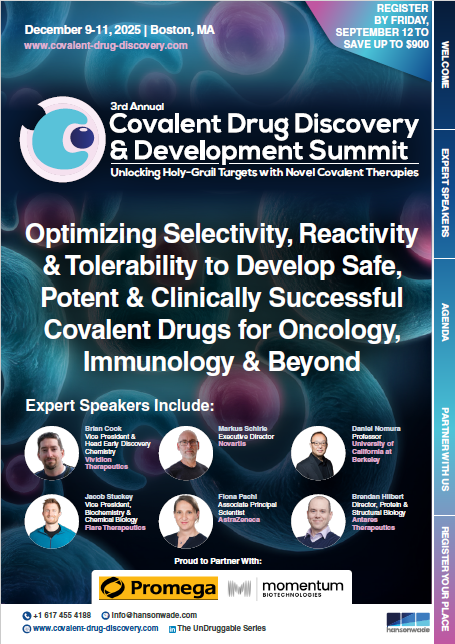Workshop A | 9:00 am
Designing the ‘Holy-Grail’ Warhead to Optimize Selectivity, Reactivity, Affinity & Clearance to Facilitate Development of Efficacious, Safe Covalent Drugs
Brian Cook, Vice President & Head of Early Discovery, Chemistry, Vividion Therapeutics
Laura D’Agostino, Vice President, Chemistry, Monimoi Therapeutics
Maintaining the perfect balance between selectivity and reactivity is key to ensuring covalent therapies are safe and efficacious, but achieving this harmony is challenging.
This workshop will cover:
- Balancing warhead reactivity, selectivity, stability and non-covalent interactions to enable successful binding with cysteine and non-cysteine residues and develop potent, tolerable covalent drugs
- Addressing metabolic challenges by optimizing warhead structure to improve PKPD properties and achieve effective affinity and clearance rates whilst limiting risk of immunogenicity
- Utilizing proteomics, activity based and clickable probes, crystallography, molecular dynamics, biochemical and biophysical methods to measure characteristics of warheads and facilitate ongoing optimization
Lunch | 12:00 pm
Workshop B | 1:00 pm
Elucidating Covalent PKPD Relationships & Developing Robust Models to Understand Clearance & Inform Dosing Strategy
Sarah McFann, Principal Scientist, Novartis
Lata Jayaraman, Senior Vice President & Head of Oncology & inflammatory Disease Research, Frontier Medicines
To progress covalent therapies through the pipeline to patients, appropriate dosing regimens must be determined to ensure safety and therapeutic response. Understanding PKPD and ADME properties is vital.
This workshop will cover:
- Accurately measuring covalent drug and protein half-life, clearance and target occupancy in a non-equilibrium setting across a range of tissues to elucidate PKPD relationships
- Determining the significance of the interaction between PK, PD, KI, Kinact, target
engagement and efficacy, and translating these insights from preclinical models to
humans - Optimizing dosing with in-depth insights into PKPD and ADME and in vitro, in vivo
and in silico modelling data, as well as predictive AI, to inform clinical strategy

